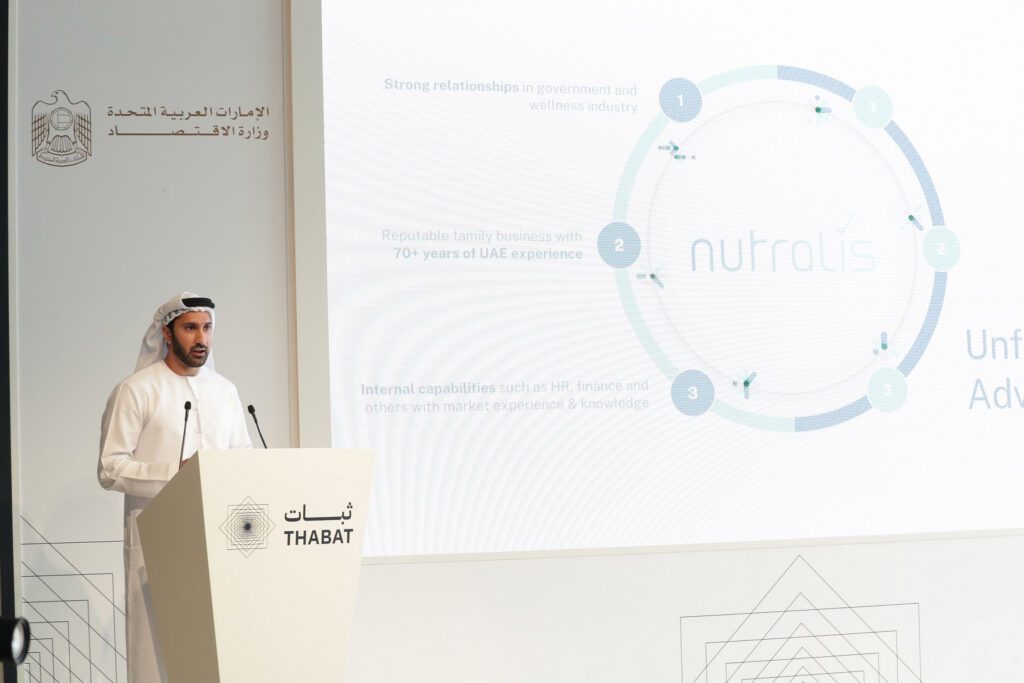The Ministry of Economy’s ‘Thabat’ family business program has successfully crafted a fresh and sustainable business vision for the Al Yousuf family name Nutralis. It aligns with the company’s future economy through an extensive training program spanning more than 550 working hours.
This program encompassed training sessions, legal and technical consultations, and provided the theoretical and technological backing essential for expanding family businesses into novel economic sectors and activities.
Participants Gained Insights on Digital Project Selection and Brand Success
The program educated participants on selecting an appropriate concept for a digital project, conducting market analysis, enhancing product advantages for customers, boosting competitiveness, and establishing a successful brand.
This collaborative journey culminated in the launch of Al Yousuf Group’s latest venture, ‘Nutralis’ – a versatile digital platform that unites health and food supplement manufacturers not requiring medical prescriptions with physicians.
This platform fosters the exchange of insights and product effectiveness in a highly transparent setting, aiming to offer consumers of these products a secure and effective environment to enhance their quality of life.
Through the ‘Thabat’ program, the Ministry of Economy offers flexible pathways for family enterprises to safeguard their future operations through two distinct models, according to WAM.
The first model focuses on enhancing the company’s current business domains by harnessing new technologies and tools, thereby augmenting the competitiveness of their products and services.
In contrast, the second model supports their entry into fresh sectors, contributing to the expansion and diversification of family business activities, and presenting additional opportunities for sustainable growth.
Yousuf Al Yousuf, Chief Operating Officer at Al Yousuf Group, said: “Thabat gave us a key opportunity to take advantage of all the benefits and capabilities it offers to family businesses in the country. The program contributed to realigning our vision and business plans towards a vital sector, which is the food sector. It enabled us to explore new industries and business models to keep pace with the trends of the new economy, leading us to the launch of our new digital project ‘Nutralis.”
He added: “We are finalizing a joint action plan with Thabat to ensure the project’s leadership in the food sector and the achievement of all its objectives, especially since we now have a broader consumer base through the digital platform.”
‘Thabat’ Phase One: ‘Nutralis’ and ‘Apterra’ Innovations Emerge
The initial phase of ‘Thabat’ has given rise to two groundbreaking projects: ‘Nutralis,’ developed by the Al Yousuf Group, and the ‘Apterra’ platform by the Alserkal family, tailored for the real estate sector.
Over the next three years, the Ministry of Economy has adopted a fresh approach to assist family companies within the nation to expand their operations by participating in the program.
It will offer funding opportunities to support the growth of family enterprises that successfully complete the program. Each year, the program will accommodate two batches, with 7 to 10 companies in each batch.
The Ministry has diligently designed an integrated mechanism to facilitate the expansion of family businesses into new economic sectors.
This initiative aims to enhance their contribution to national economic growth, ensure their sustainability across generations, and govern them in accordance with the best practices.
Partnerships at both local and global levels drive these efforts, ultimately positioning the UAE as a prominent destination for local, regional, and international family enterprises.
The Ministry of Economy invites all family enterprises in the country desiring to evolve their businesses and embrace new economic sectors to register for the second edition of the ‘Thabat’ program via the following link: [Insert Link].
The ‘Thabat’ program was launched to preserve the economic and commercial legacy of the UAE’s family businesses.
It encourages their continuity across successive generations by motivating them to explore new economic activities, with the aspiration of transforming 200 family enterprises into fast-growing startups by 2030.
Currently, family businesses constitute 90% of the total number of private companies in the country and contribute 40% to the national GDP.


